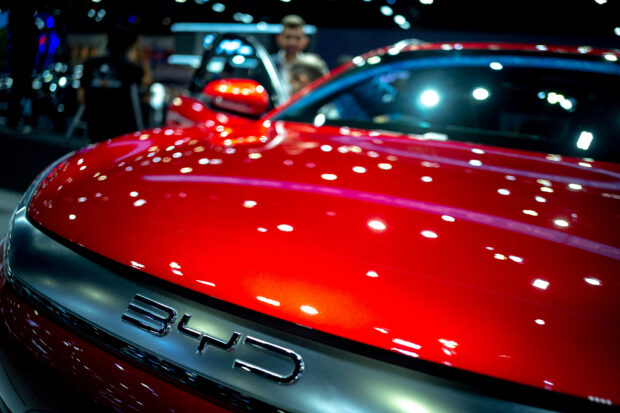The BYD Atto 3 EV car is currently on display at the 39 Thailand International Motor Expo in Bangkok, Thailand. (Photo: REUTERS/Athit Perawongmetha/File)
BANGKOK – Siam Motors, a Thailand-based car group, has been in a profitable partnership with Nissan Motors since 1962. However, the family-owned company is now seeking new opportunities and considering partnerships with Chinese automakers for high-end electric vehicles. Vice President Sebastien Dupuy revealed in an interview that Siam Motors is currently in talks with several Chinese automakers for potential collaborations, focusing specifically on the growing market for electric vehicles.
This shift in Siam Motors’ strategy reflects the changing landscape in Thailand’s auto industry, as Chinese investments have increased and started challenging the dominance of Japanese automakers. Since 2020, Chinese automakers such as BYD and Great Wall Motor have invested $1.44 billion in Thailand, causing a disruption in the market. The rise of electric vehicles has pushed Thai companies, including Siam Motors, to seek new partnerships and adapt to the changing dynamics. Thailand’s auto industry is a significant player in Southeast Asia, with Japanese automakers historically dominating the market. However, Chinese investors have now overtaken Japanese investors, and the entrance of Chinese EV makers is reshaping the industry.
Thailand’s transition to electric vehicles serves as a test case for other economies. As Chinese automakers increase their exports and establish production hubs overseas, they are shaking up markets that were previously dominated by Japanese automakers. For example, China’s automakers are also making a strong push in Europe, where electric cars account for nearly a fifth of overall sales. Thailand, as Southeast Asia’s largest car producer and exporter, represents a significant opportunity for Chinese EV makers, who see the existing supply base built for Japanese automakers as an attractive incentive.
Last year, only around 1 percent of the nearly 850,000 new cars registered in Thailand were electric vehicles. However, between January and April of this year, the proportion rose to over 6 percent. 18,481 EVs were sold during this period, with BYD leading the market, followed by China’s SAIC, Hozon, and U.S. automaker Tesla. In contrast, Japanese automakers like Toyota, which dominated the Thai market until now, saw their market share decline. Analysts predict that Chinese brands could gain at least 15 percentage points of share over the next decade as they offer more affordable EV options.
Recognizing the potential of the EV market, Toyota, along with its group companies, has invested nearly $7 billion in Thailand over the past decade. The company is now considering EV production in the country, signaling a shift in its strategy. Toyota has also seen a positive response to its electric bZ4X model in Thailand, with 3,356 bookings so far. However, analysts suggest that Toyota and other Japanese automakers should consider expanding their product segments to keep up with the growing demand for EVs.
Thailand aims to become the main regional production hub for EVs by converting 30 percent of its annual production to electric vehicles by 2030. The country is actively seeking investment from EV makers and offering incentives such as lower import tariffs and tax breaks. The Board of Investment in Thailand has already approved 14 projects, representing an annual production capacity of 276,640 EVs as of May 31. Great Wall, a Chinese automaker, selected Thailand as its regional EV hub due to the country’s strong infrastructure, supplier and talent base, and growth potential.
In conclusion, China’s investments in Thailand’s auto industry have sparked a competition with Japanese automakers for market dominance in the country. With the rise of electric vehicles, Thai companies are seeking partnerships with Chinese automakers to capture the growing market. Thailand’s transition to EVs serves as a test case for other economies facing a similar shift. Chinese automakers are aggressively expanding their overseas operations and challenging established players in markets like Thailand and Europe. For Japanese automakers, it is crucial to adapt their strategies and product offerings to stay competitive in the evolving automotive landscape.
Denial of responsibility! SamacharCentrl is an automatic aggregator of Global media. In each content, the hyperlink to the primary source is specified. All trademarks belong to their rightful owners, and all materials to their authors. For any complaint, please reach us at – [email protected]. We will take necessary action within 24 hours.

Omprakash Tiwary is a business writer who delves into the intricacies of the corporate world. With a focus on finance and economic landscape. He offers readers valuable insights into market trends, entrepreneurship, and economic developments.


